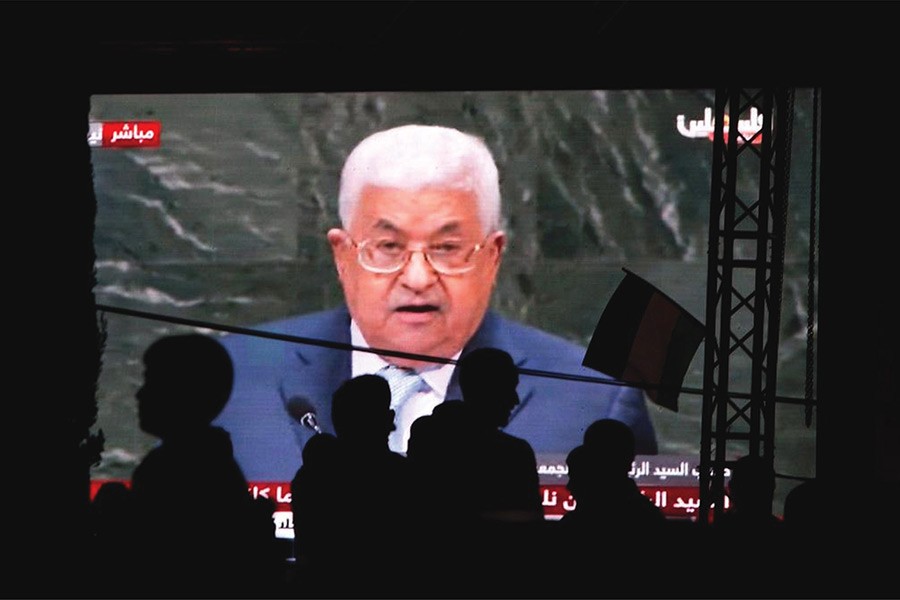In 1993, twenty-five years ago, the Oslo Accord was signed between Israeli Foreign Minister Shimon Peres and Palestine leader Yasser Arafat. It outlined a timeframe for a lasting Middle Eastern peace process involving Palestine and Israel. Subsequently, on 13 September 13, 1993, Yasser Arafat and the then Israeli Prime Minister Yetzhak Rabin shook hands on the lawn of the White House in Washington, overlooked by a congratulatory US President Bill Clinton. As a result Arafat, Rabin and Peres were awarded the Nobel Peace Prize in 1994.
The Oslo Accord established the Palestinian National Authority (PNA), a self-governing interim administration in the Palestinian territories. As of August this year, 137 out of 193 member states of the United Nations have recognised the State of Palestine.
But the two-State solution has still remained elusive. The world has instead watched, according to a West Bank-based journalist, "the steady advancement of Israeli interests and Palestinian fragmentation".
Israel has deepened its many West Bank settlement projects while "taking active measures to ensure geographic and political division among the Palestinians". Israel's matrix of control over Palestinian way of life is all but complete and its domination in the disputed region is virtually unchallenged, thanks to a partial White House.
Under the Oslo principles "the West Bank and Gaza Strip, while still under Israeli occupation, were divided into geographic chunks, with various types of jurisdiction split between Israeli and Palestinian Security Forces. Area C, which constituted the vast majority of Palestinian land and included all Israeli settlements, was left securely in Israeli hands. Area A, which encompassed the largest Palestinian cities, such as Ramallah and Nablus was handed over to Palestinian Security Forces who were trained by Israeli and American handlers. Area B was designated as being under Palestinian Security control."
However today, looking back, all these ramifications appear to have had no positive osmotic effect for the Palestinians as Israel has continued to exercise its authority at will.
US STOPS FUNDING UNRWA: The situation on the ground has not been helped with the present US Administration deciding last month to cut all funding to the United Nations Relief and Works Agency (UNRWA). This Agency is responsible for providing support to Palestinian schools, look after their healthcare and also assist the Palestinian refugees. The US Administration has also announced a few days ago that it was withdrawing funding of US$ 25 million meant for East Jerusalem hospitals, where those seeking healthcare are mostly Palestinians.
There has also been another controversial decision from the US State Department regarding the closure of the Palestine Liberation Organisation's Washington Mission. Husam Zumlot, Head of the PLO General Delegation to the United States, has been asked to leave the USA along with his family members and also vacate the building where his office was located by October 13 as the lease for that building would not be renewed.
The Palestinian leadership is feeling that contrary to the spirit of constructive engagement, they are being slowly pushed further to the edge. They feel that such a step would only create greater anger among the Palestinian citizens. They already have to bear with Donald Trump's controversial decision of recognising Jerusalem as Israel's capital and moving the US Embassy there from Tel Aviv -reversing decades of US policy. Palestinians claim East Jerusalem as the capital for an independent Palestinian State.
Observers are pointing out that President Trump is trying to force the Palestinians to the negotiating table as the White House is supposedly preparing a plan for Middle East peace - which is being termed as the "ultimate deal".
PALESTINIAN RESPONSE: Responding to Trump's pro-Israel initiatives, Palestinian President Mahmoud Abbas has declared that Palestinians will no longer accept United States as a moderator. The Palestinian Authority are also considering bringing the entire adverse humanitarian situation related to the Palestinians to the attention of the International Criminal Court (ICC).
Abbas has spoken in harsh and unflinching terms about Israel and the US at the UN General Assembly in New York on September 27. Abbas began his address by stating that "Jerusalem is not for sale"- a statement which drew applause from the delegates. He denounced Israel's nation-state law as "racist" and condemned Trump administration's uncritical support of Israel and both states' refusal to abide by international agreements and UN resolutions. In his first speech to the UN since the US moved its embassy from Tel Aviv to Jerusalem, Abbas said Palestinians now see the US "with new eyes" and no longer as a fair mediator in the peace process.
All need to remember that failure to treat the PLO as the representative of the Palestinian people is likely to re-set Palestinian-Israeli relations for the worse - going backward to pre-Oslo times. The rejection of Palestinian efforts towards freedom will only intensify anger which would, in turn, create further instability, leading to terrorism.
Palestine continues to be an important issue. Another round of negotiations between the relevant parties (which collapsed in 2014 and have since remained in a state of suspended animation) should begin as soon as possible. Hope cannot be trampled under the boots of opportunism.
Muhammad Zamir, a former Ambassador, is an analyst specialised in foreign affairs, right to information and good governance.


